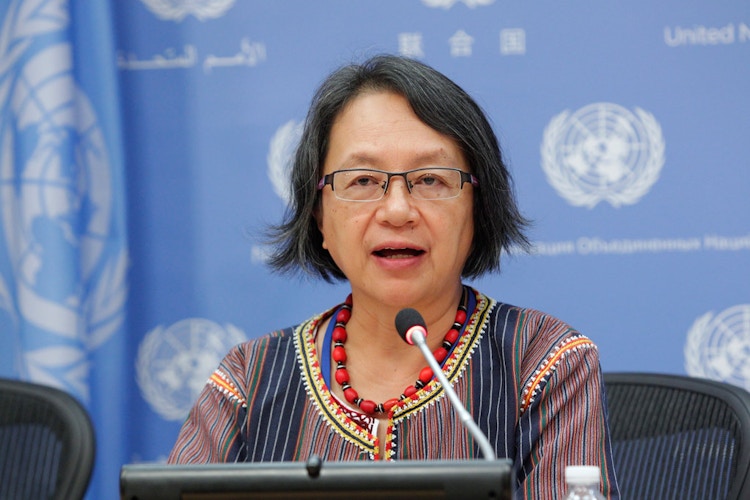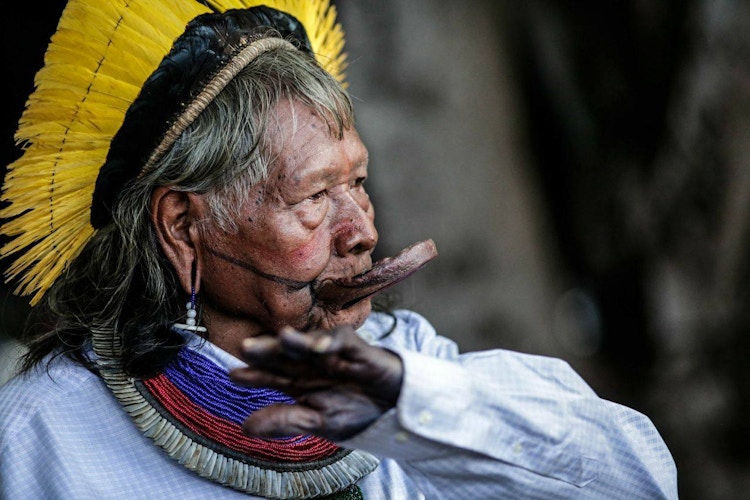Nobel Peace Prize to the Indigenous movement?
Two Indigenous activists, Victoria Tauli-Corpuz and Juan Carlos Jintiach, are included on credible shortlists as possible winners ahead of Nobel Peace Prize announcement in Oslo this Friday.

Juan Carlos Jintiach and Victoria Tauli-Corpuz. Fotos: GATC and UN
By Kristin Rødland Buick.
The Norwegian Peace Research Institute (PRIO) and the Washington Post have both shortlisted the nominated indigenous activists as possible winners. The winners of the Nobel Peace Prize will be announced Friday, 6 October, in Oslo.
Tauli-Corpuz and Jintiach have in different ways brought the indigenous fight for rights and nature protection to the global arena. Juan Carlos Jintiach is the leader of GATC, a global political platform of indigenous peoples and local communities working to protect indigenous rights and nature conservation. Victoria Tauli-Corpuz has served as the UN Special Rapporteur on the Rights of Indigenous Peoples.
Raoni Metuktire, one of the world's most well-known indigenous leaders, is also mentioned by other experts as a favorite to win the Nobel Peace Prize.
«Awarding the Nobel Peace Prize to indigenous rights activists would be a great recognition of the entire indigenous movement, their fight for indigenous rights and their vital role in the protection of nature,» says Tørris Jæger, executive director of Rainforest Foundation Norway.
Financial support for indigenous rights still lacking
This recognition is still lacking in terms of financial support. Indigenous lands are some of the best preserved areas in the world, yet Indigenous groups receive very little funding to continue this globally crucial work. Rainforest Foundation Norway’s report Falling Short revealed that less than one percent of global climate funding reaches indigenous communities.
«Indigenous people hold the key to the preservation of some of the world’s last pristine ecosystems, providing the world with fundamental services such as water production and carbon sequestration. Their work lays the foundations for peace, and they need recognition of their role to continues this crucial work», says Tørris Jæger.

Victoria Tauli Corpuz. Photo: UN
Profile: Victoria Tauli-Corpuz
Victoria Tauli-Corpuz is an indigenous rights activist from the Kankana-ey Igorot people of the Cordillera Region in the Philippines. She is the founder and current leader of the Tebtebba Foundation (Indigenous Peoples' International Centre for Policy Research and Education).
Tauli-Corpuz has served as the UN Special Rapporteur on the Rights of Indigenous Peoples as well as the chair of the UN Permanent Forum on Indigenous Issues. Through the promotion of indigenous rights across the world, she has worked with tropical forest conservation, climate change, social justice and women’s rights issues.

Profile: Raoni Metuktire
Raoni Metuktire is probably the world's best-known Indigenous leader and was nominated for the Nobel Peace Prize in 2019. He has been a prominent figure in the fight to protect the Amazon and the rights of Indigenous peoples in Brazil. Raoni has made several trips worldwide and has met a series of leaders, including King Leopold III of Belgium and France's Jacques Chirac.
In the late 1980s, Raoni began collaborating with British musician Sting. A joint world tour in 1989 would later prove significant in opening the world's eyes to the ongoing destruction of the rainforest and the violation of Indigenous peoples' rights.
This tour aimed to gain recognition of a separate territory for the Kayapó people living along the Xingu River in Brazil. The International Rainforest Foundation was founded with national chapters in several countries, including Norway, the UK, the US, and Japan. In 1991, after two and a half years of campaigning and pressure, a 49,000 km2 territory was created for the Kayapó. They have also gained recognition of other essential areas forming a crucial belt of preserved rainforest in Brazil.
One of Raoni's biggest causes has been the fight against the development of "Belo Monte" - one of the world's largest hydropower plants. Plans to build a hydropower plant on the Xingu River first emerged during the military dictatorship, but after large-scale mobilizations led by Raoni, the project was halted. Despite massive opposition and international attention, the plans were later revived.
Raoni's tenacious fight to preserver the rainforest and ensure recognition of Indigenous rights has paved the way for and inspired thousands of people, not least among other indigenous peoples.

Juan Carlos Jintiach. Photo: GATC
Profile: Juan Carlos Jintiach
Juan Carlos Jintiach is an Indigenous leader from the Shuar people in the Ecuadorian Amazon, and is currently the Executive Secretary of the Global Alliance of Territorial Communities (GATC). The alliance includes large Indigenous organisations from across the tropics, from COICA and APIB in the Amazon to AMAN in Indonesia and REPALEAC in Africa. Rainforest Foundation Norway has long-term partnerships with these organisations in the fight for Indigenous rights and nature protection.
Jintiach has also represented the Indigenous peoples of Latin America in the Convention on Biological Diversity and has served as a co-chair and a focal point in the indigenous people’s caucus within the UN Framework Convention on Climate Change.
For a long period of time he was one of few Indigenous voices on the global climate arena. Now he is joined by many. Jintiach has worked tirelessly to connect community concerns with global policy discussions, aiming to build consensus.

Kristin Rødland Buick
Senior Adviser, International Communications
(+44) 776 858 2930
kristin@rainforest.no